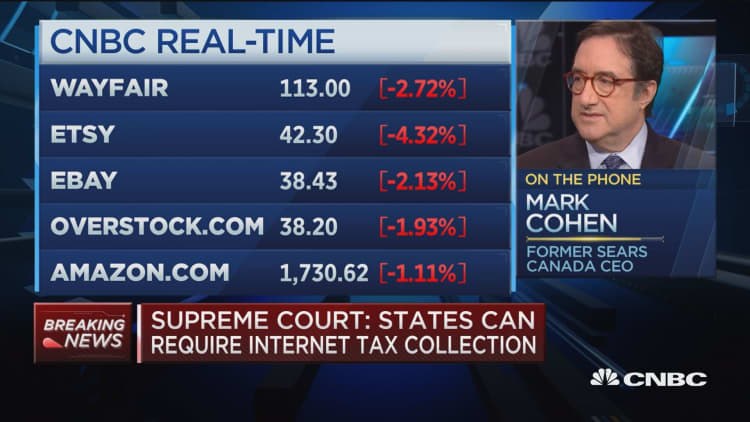
The U.S. Supreme Court's decision Thursday to allow states to force online retailers to collect local sales tax will even the playing field between e-commerce and legacy retail, industry leaders told CNBC.
"This is a victory for common sense and the economic realities of this century," Jerry Storch, former CEO of both Toys R Us and Hudson's Bay, said on "Squawk Alley."
"The previous law rewarded what was really a form of tax evasion that accelerated the demise of Main Street and all brick-and-mortar retailers," added Storch, also former vice chairman of Target.
The 5-4 ruling against Wayfair, Overstock.com and Newegg overturned a precedent set by the Supreme Court in 1992 that barred states from forcing companies to collect local sales taxes unless they had a "physical presence" in that state.
The disparity in tax requirements hit mom-and-pop shops particularly hard, Storch said. "It had given e-commerce companies an advantage they clearly did not need."
Mark Cohen, former CEO of Sears Canada, told CNBC that the ruling was "an inevitability." Although he said he did not believe it would affect the growth of e-commerce, Cohen said that it will change the conversation around the issue.
"It puts an end, I think, to the ongoing sniveling and whining on the part of legacy organizations that e-commerce players have had an unfair advantage, whether they had an unfair advantage or no. That kind of distortion is now clearly over," he told "Squawk Alley."
Although sales tax rates can seem insignificant, it has a big impact on retailers, according to Ron Johnson, former CEO of J.C. Penney. He said when he was at Target in the 1990s, the mega-retailer would plan six months in advance to have the necessary inventory of school uniforms during local sales tax holidays to accommodate the mad dash.
"At the margin, this tax stuff really does impact decision-making," Johnson said on CNBC.

While the retail world may be thrilled with the ruling, Grover Norquist, president of Americans for Tax Reform, said on "Squawk Alley" that the decision could have far-reaching ramifications.
According to the court's opinion, he said, "you can be taxed by a state you don't live in, you can be taxed by a city you don't live in, and if they do that for businesses, they can do that for individuals."
Steve Sadove, former CEO of Saks Incorporated, told CNBC that the Supreme Court's decision would be good for retail, but that the ruling in and of itself may not be the final step, as it would need to be interpreted and implemented on a state-by-state basis.
"There probably would still be a benefit to having national legislation to clarify how they ought to be collecting the taxes," he said.

